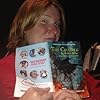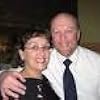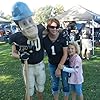To answer questions about
Eleanor Oliphant Is Completely Fine,
please sign up.
Melody
As someone who has a professional diagnosis of autism which I finally received in my 40s I have been most upset by some comments. Every single autistic person is as different and individual as neurotypicals. I would never assume that all neurotypicals are good at social skills or enjoy physical contact just because they aren't Autistic. To suggest Eleanor cant be autistic because she likes holding hands is innacurate. I love to hold my husband's hand or my daughter's hand (Yes, shock horror, I am autistic, married and have a non autistic child!!) However, if a stranger were to touch me or even stand slightly close to me it would cause me huge anxiety. If my husband took my hand unexpectedly I would flinch. All behaviours can vary from day to day as with any human being. External factors as well as the autism itself have a bearing on how my traits present themselves. Also, Austism and it's huge range of traits and behaviours are measured on a spectrum and not a linear scale from severe to high functioning.
To suggest its used as an excuse is incredibly insulting. Getting a proffessional diagnosis is an extremely difficult process (especially as an adult) often taking years so to suggest there is some kind of bandwagon is extremely ignorant and ill informed. It took months of interviews with various teams of professionals, my whole family had to be interviewed so they could be sure my issues had been since infancy and I had to get all my old school whixh was almost impossible.
My experience is that autism is not over diagnosed but in fact under diagnosed especially in women The diagnostic criteria they use is based on males who often present as having more classic signs than girls.
Many autistic people have been victims of abuse and suffer ptsd as a result of being bullied, lonely and living their whole lives feeling disconnected and confused by the world. PtSD and autism are far from being mutually exclusive. IF YOU'VE MET ONE PERSON WITH AUTISM YOU ONLY HAVE ONE EXPERIENCE OF AUTISM.
It makes me so sad (Yes, I feel emotions very deeply as many autistic people do) that in an age of so-called autism awareness that there is still so much misinformation and ignorance. I hope my post goes some way to dispell some very damaging myths
To suggest its used as an excuse is incredibly insulting. Getting a proffessional diagnosis is an extremely difficult process (especially as an adult) often taking years so to suggest there is some kind of bandwagon is extremely ignorant and ill informed. It took months of interviews with various teams of professionals, my whole family had to be interviewed so they could be sure my issues had been since infancy and I had to get all my old school whixh was almost impossible.
My experience is that autism is not over diagnosed but in fact under diagnosed especially in women The diagnostic criteria they use is based on males who often present as having more classic signs than girls.
Many autistic people have been victims of abuse and suffer ptsd as a result of being bullied, lonely and living their whole lives feeling disconnected and confused by the world. PtSD and autism are far from being mutually exclusive. IF YOU'VE MET ONE PERSON WITH AUTISM YOU ONLY HAVE ONE EXPERIENCE OF AUTISM.
It makes me so sad (Yes, I feel emotions very deeply as many autistic people do) that in an age of so-called autism awareness that there is still so much misinformation and ignorance. I hope my post goes some way to dispell some very damaging myths
lucky little cat
Yes, Eleanor struggles with social skills and perspective taking, and these are hallmarks of autistic spectrum disorder.
Anyone who believes Eleanor can't be ASD because she improves is working with a very limited perspective on autism.
And yes, emotional (and physical) trauma, isolation, and deprivation could produce the same social skills deficits. (But won't always.)
It's a chicken-and-egg question, but an interesting one.
On edit: the range in responses in the following answers is fascinating. I never imagined people would casually take sides on this as if it were a sporting match. Thanks to all of you who based your informed answers on firsthand experience or professional training.
Anyone who believes Eleanor can't be ASD because she improves is working with a very limited perspective on autism.
And yes, emotional (and physical) trauma, isolation, and deprivation could produce the same social skills deficits. (But won't always.)
It's a chicken-and-egg question, but an interesting one.
On edit: the range in responses in the following answers is fascinating. I never imagined people would casually take sides on this as if it were a sporting match. Thanks to all of you who based your informed answers on firsthand experience or professional training.
Sandra
No. Having worked with abused children, her behaviors are typical of a survivor of abuse.
Colette Guerin
You are asking if she has a neurological disorder. It isn't out of the question, but your are asking if this is nature over nurture. Her nurturing was truly defective and that does not put one on the spectrum, it leaves them lacking skills. It does not mean that they have any less difficulty navigating the world and finding their place in it. I don't think she is an Aspie, but a victim of abuse. She was not abused due to her behaviors, but due to a mentally ill mother. So that too makes me doubt neurological problems existed. You are going back to old theories as to the cause of autism.
Karen
I guess we finally know for sure, as the author says "no".
https://www.telegraph.co.uk/women/lif...
https://www.telegraph.co.uk/women/lif...
Miranda
This book is clearly about Complex Trauma, which looks like PTSD mixed with symptoms of depression and anxiety. When you educate yourself on Complex Trauma, you see her individualized way of thinking, the flashbacks, and the isolation are all defense mechanisms she has developed throughout her upbringing. These are all tools she had in order to minimize the pain her mother inflicted on her. When a child is abused throughout their development, and never truly leave their abuser, this is what happens. Your sole focus is to survive, to make it, never mind about developing social skills, sheesh! Recall her ability to go to another imaginary world, one that is not painful and completely blocks a triggering present from her mind? It's clear her behavior did NOT develop from autism this example as well- she had the emotional capacity to relate to others easily before her traumatic experience. Afterwards, she isolated herself. She continues to isolate herself and hold onto these defenses until the day she stops talking to her mother, which is the absolute root of her abuse.
I would advise people to be careful - this is a pretty triggering story and can be very relatable for some child abuse survivors! Simply concluding she is the way she is because of a neurological disorder totally minimizes the power, control, and trauma of child abuse. Eleanor is a very exaggerated case, I think because the author tried very hard to get a message across. So many people who suffered from child abuse go through life with the anxieties, depression, flashbacks, and loneliness that Eleanor talks about, but appear perfectly normal on the outside. The feelings are the same, yet also very individualized for each person. I think the author just wanted to exaggerate Eleanor's appearance on the outside so that people become more aware.
I would advise people to be careful - this is a pretty triggering story and can be very relatable for some child abuse survivors! Simply concluding she is the way she is because of a neurological disorder totally minimizes the power, control, and trauma of child abuse. Eleanor is a very exaggerated case, I think because the author tried very hard to get a message across. So many people who suffered from child abuse go through life with the anxieties, depression, flashbacks, and loneliness that Eleanor talks about, but appear perfectly normal on the outside. The feelings are the same, yet also very individualized for each person. I think the author just wanted to exaggerate Eleanor's appearance on the outside so that people become more aware.
Sarah Gingrich
As a professional who works with people on the spectrum, I would say yes. While her behaviors are also typical of an abuse survivor (the severe anxiety, stress responses, social isolation, flashbacks), some of her other behaviors, such as confusion about social norms, being "argumentative" with foster parents about routines or expectations (often the result of very black and white thinking on the child's part, and adults who are unable to understand the child's point of view) very careful and planned use of social cues such as "air quotes", are also fairly typical of a person on the autism spectrum. Although this may have just been sort of a model for her character that the author used--based on how the story progressed (not wanting to add spoilers, but people who read the book will know what I mean), if the author's intention was for her to have a form of autism, this may have been brought up in conversation between Eleanor and another character.
Cynthia Harrison
She does come off that way, but I don't think she is. She's damaged, for sure, but it came from nurture (or lack of) not nature.
Geraldine
I don't think she is ASD- the tragedy of the book is that a normal little girl has been so damaged. She does exhibit some features similar to autism but her lack of social skills is because she has had to bring herself up and has had limited opportunities to socialise. The routines are ways of keeping herself safe/comforting having had a traumatic past .. and again because she doesn't know any different because of lack of role models.
Sue
This answer contains spoilers…
(view spoiler)
Amy
As an Aspie myself (diagnosed by a medical professional and not self-diagnosed), my answer is no. There are so many different markers of autism and struggling with social skills like she does in this book is actually quite a small one, as the spectrum is much, much more complex than that.
Without giving spoilers, I believe we find out the cause of her behavior as the story goes on. Initially, it is a conclusion we jump to - that she has Asperger's - and I do think that was done intentionally by the author, given the overall theme of the book about connection, people, loneliness, and the private lives people live and the journey Eleanor is on herself.
Without giving spoilers, I believe we find out the cause of her behavior as the story goes on. Initially, it is a conclusion we jump to - that she has Asperger's - and I do think that was done intentionally by the author, given the overall theme of the book about connection, people, loneliness, and the private lives people live and the journey Eleanor is on herself.
Mack
I am going through the diagnosis process right now (meaning it's not entirely sure but very likely I am on the spectrum) and also went through some trauma in my childhood (even though fortunately not that extreme) and I think it's entirely possible she's autistic and I read her like this the entire time. In my interpretation, the trauma just forced her to develop unhealthy coping mechanisms (alcohol, social isolation) and additional problems (flashbacks etc)
She has problems with social skills (very honest and literal, problems with social cues), has a strict need for routine, stronger black-and-white thinking, special interests (classics, the musician) and sensory issues (seems to be sensitive to sensory inputs like touch and sounds). I must admit I found her quite relatable in some aspects.
But of course, we don't know for sure if these traits have already been present in her childhood, which is possible. Women on the spectrum are also often found to be able to hide traits better due to social pressure
She has problems with social skills (very honest and literal, problems with social cues), has a strict need for routine, stronger black-and-white thinking, special interests (classics, the musician) and sensory issues (seems to be sensitive to sensory inputs like touch and sounds). I must admit I found her quite relatable in some aspects.
But of course, we don't know for sure if these traits have already been present in her childhood, which is possible. Women on the spectrum are also often found to be able to hide traits better due to social pressure
Jan
No, I don't think so. She is a victim of abuse. I am a teacher and I see so many people who jump to the asperger's diagnosis the minute a child has some difficulties. We make it much too frequently and, when we do, we are ignoring the idea that a person can have many of the characteristics that Eleanor has and NOT be an aspie. Abuse is a terrible thing. Don't underestimate it's effect on someone like Eleanor. It is like the diagnosis of ADHD....everytime a child runs around the classroom, someone says she has ADHD. NO,....she is just running around the room. I, as the teacher, need to teach her appropriate behavior, not diagnose her as ADHD. With Eleanor, we need to treat her symptoms, not slap her with a medical diagnosis of Asperger's.
Scott
I have become more and more aware of people almost proudly announcing that they are an "Aspie" and have been undiagnosed all their life. The broadening of the spectrum and the numerous films, TV shows and books on the theme have made it kinda cool to identify with having Asperger's. I sense that secretly, people are also wishing to identify with the sometimes off the scale intelligence and eccentricity sometimes associated with Asperger's. I think that, for many people, a diagnosis of Asperger's is preferable to the difficult work required to heal the scars of a traumatic past. So being an "Aspie" becomes an excuse.
I'm in the no camp! Eleanor shows many of the signs of being a survivor of physical and emotional abuse.
I'm in the no camp! Eleanor shows many of the signs of being a survivor of physical and emotional abuse.
Lonni
This answer contains spoilers…
(view spoiler)
Penny
Eleanor is a fictional character. Surely the only person who can answer this question is the author!
Meko
I know that the author says no, but as someone that is formally diagnosed she does seem autistic to me. A lot of writers (for all types of media) often unknowingly create autistic persons since these characters are often based off of undiagnosed autistic individuals in their lives. She does have the symptoms of PTSD, but she also has the symptoms of ASD. Having PTSD does not make you a literal thinker among other things. She also has problems with socializing which is not rooted in social anxiety and I fail to see what PTSD has to do with that as well. She acts like someone that has ASD and PTSD. So I vote yes. I believe that she is autistic.
HannaClara
Probably the intention of the author was to portray her as a traumavictim, but it seems unlikely that trauma alone would make her so oblivious to social norms and she also takes everything literally ... which are more ASD traits. My guesses are if she were only a victim of trauma (from childhood maltreatment), she would have social (and maybe general) anxiety, perhaps avoid people or be a people pleaser (where natural people skills would come in handy) , would suffer from depression and feelings of unworthiness, have nightmares and flashbacks (or repress it completely and be shut of ). Some of these seems to fit for sure, but the more ASD like traits can´t all be explained by that I think, especially not since she went to kindergarten , school etc and was in fostercare from the age of 10. If she was locked in a room as a kid with no one to talk to that would probably be a different story though, since she wouldn´t have a chance to develop naturally. But I still wonder if that would give her asperger traits? Anyways just my thoughts / clinical psychology MD
Beth
This answer contains spoilers…
(view spoiler)
Stephanie
I guess spectrum is possible, but given her level of trauma and learned coping behaviors, I decided in the end that she was not. She recognized social cues when she received the sweater, for example. I think her regimented thought processes were coping skills.
Judy Lindow
No, I think she was highly intelligent, with self destructive and self medicating coping mechanisms; I think she suffered from burying her painful memories/experiences of abuse (that probably amounted to severe traumatic stress). Strategies she used to 'deal' with hiding and suppressing what she went through included amnesia, her mother's voice (she'd incorrectly self identified with), and isolating. An overlap of strategies due to the guilt related to her sister included lack of self care, self worth etc. I think the book is about this fantastic time when she starts to thaw, and become open to love, new experiences, and letting go of the past. I think her stilted language, her impatience with others, her better than, lack of social acumen is connected to her nurture (I.E the intense relationship and lack boundaries she had with her mother).
Squibart
I agree she comes across as falling on the spectrum of Autism, but as I learned of her trauma I kept picturing more Reactive Attachment Disorder. I think she could be given a variety of diagnoses related to family genetics and trauma induced issues. I think she can be what you see in her. Even professionals rarely agree in the real world.
Deirdre
As a spectrumite myself, I strongly believe Eleanor has ASD. Even taking her past into account, she displays certain traits that are very tellingly ASD and that cannot be accounted for simply by trauma alone, in my opinion.
Barb Corwin
I would say no. While she certainly has a lot of the same characteristics, I think her behaviors are in response to a need to be able to control some aspects of her life.
Janine Moloney
Eleanor is definitely an Aspie! High Functioning Aspergers. She is a classic, absolutely loved her. She has all the characteristics, my children are diagnosed, but Eleanor is like she comes straight out of an Aspergers book!
Ann
She has PSTD----post-traumatic syndrome and likely major depression. She likely also has social anxiety. All this cannot be solved in two-plus months of therapy. That's totally unrealistic.
jen
i dont think so. i think she lacks social skills as a result of her trauma.
Erin
This answer contains spoilers…
(view spoiler)
Catie Currie
I assumed that she was just from reading the description and the first couple chapters, but after a little while it becomes clear that she is the way she is due to childhood trauma (in my opinion at least)
Trisha
Aspergers don't like to be touched. Eleanor repeatedly talks about how she liked holding someone's hand or being touched and feeling good about it. Also they don't read people's feelings well and Eleanor was great at this.
Lolly
No one has mentioned that Eleanor does not understand common idioms despite being very intelligent and well-read. It seems somewhat incongruous at times but may also be an indicator of something going on.
Eileen
I have worked with Autistic children for over 20 years. Each child is totally different with a wide range of capabilities and challenges. I think it very possible that Eleanor is on the spectrum. Some people with the diagnosis have other diagnoses, also. I am sure that Eleanor also had PTSD from her childhood traumas, too.
Michael Chapman
I'm not autistic, but I have an autistic child. For the first few chapters I thought Eleanor might be, until I realised she is obviously the victim of abuse and trauma.
I'm reading in these comments that the author has confirmed Eleanor is not autistic. I am not remotely surprised, in fact I'm more surprised that people are looking at the actions of a traumatised and abused person and putting it in a box labelled "Autism". Not cool.
I'm reading in these comments that the author has confirmed Eleanor is not autistic. I am not remotely surprised, in fact I'm more surprised that people are looking at the actions of a traumatised and abused person and putting it in a box labelled "Autism". Not cool.
Catherine
I don't think so. You do wonder, for the first couple of chapters but, as you read on, it seems she lacks social ability because she has never had the chance to learn not because she can't.
Marie
Absolutely not. Gail Honeyman said so herself in an interview!
PrairieReader
From The Telegraph on May 15, 2018:
"Unable to interpret social cues and inappropriately judgemental, Eleanor speaks with a stilted formality entirely at odds with a woman in her 30s. My supposition was that, like Saga Noren from the Scandi Noir series The Bridge, she suffered from Asperger’s. Not so.
“Eleanor isn’t anywhere on the spectrum,” says Honeyman. “She is the product of nurture, not nature; traumatic events in her childhood have shaped her. But I was really keen not to portray her as tragic or a victim; she has agency and the power to make her own decisions."
Straight from the author's mouth.
"Unable to interpret social cues and inappropriately judgemental, Eleanor speaks with a stilted formality entirely at odds with a woman in her 30s. My supposition was that, like Saga Noren from the Scandi Noir series The Bridge, she suffered from Asperger’s. Not so.
“Eleanor isn’t anywhere on the spectrum,” says Honeyman. “She is the product of nurture, not nature; traumatic events in her childhood have shaped her. But I was really keen not to portray her as tragic or a victim; she has agency and the power to make her own decisions."
Straight from the author's mouth.
Valerie
I don't think Eleanor is an Aspie. She lacks some social skills just because she was used to an isolated environment. She learnt to behave that specific way, plus depression, PTSD, emotional & physical abuse are factors that cause the existence of some social deficits.
Emma
No she's not. She's suffering from trauma, but she's not on the spectrum.
Heidi Rauch
Not on the spectrum at all!!! Poor little Eleanor developed a defense mechanism as a child that made her process contact and emotions as "bad".
Susan
I'm not an expert, but here's my non-professional opinion. Yes, she falls somewhere on the spectrum. She is only somewhat aware that sometimes she is socially inept. Another reader and I compared her to Sheldon Cooper on "The Big Bang Theory."
Ulrika
According to the author she is not on the spectrum:
“Eleanor isn’t anywhere on the spectrum,” says Honeyman. “She is the product of nurture, not nature; traumatic events in her childhood have shaped her. But I was really keen not to portray her as tragic or a victim; she has agency and the power to make her own decisions.”
“Eleanor isn’t anywhere on the spectrum,” says Honeyman. “She is the product of nurture, not nature; traumatic events in her childhood have shaped her. But I was really keen not to portray her as tragic or a victim; she has agency and the power to make her own decisions.”
Irina
Eleanor is a victim of severe trauma, neglect, physical and emotional abuse. As a child, she lived in constant fear and uncertainty and was for a few years, forced to live in isolation because her mother was afraid to allow her to interact freely with her teachers and schoolmates.
The crucial reason why we need to be extremely cautious of the diagnostic labels that we place on people is so that we can ensure that we offer them exactly the type of therapy that is best suited for their needs. In this case, if she was considered a neurodivergent individual and her history ignored, she might have been deprived of trauma-focused therapy that in essence deals with her core issues and can in turn help to gradually ameliorate many aspects and behaviors in her life.
The crucial reason why we need to be extremely cautious of the diagnostic labels that we place on people is so that we can ensure that we offer them exactly the type of therapy that is best suited for their needs. In this case, if she was considered a neurodivergent individual and her history ignored, she might have been deprived of trauma-focused therapy that in essence deals with her core issues and can in turn help to gradually ameliorate many aspects and behaviors in her life.
Matt
It is impossible to tell from first impressions or even after several days if someone's symptoms are found to fit some diagnostic criteria. Typically a good clinician will start with the least restrictive diagnosis and then, over the course of months, adjust the diagnosis. So many things must be ruled out. Substance use disorders, developmental disorders, medical conditions, medicinal side-effects, etc..
I think that as society becomes more familiar with mental health there is a tendency to diagnose everything we consider abnormal as "on the spectrum". The truth of the matter is that just because we find a person's behavior as odd, doesn't mean that it is necessarily a problem. Eleanor for example is employable and is relatively self-sufficient. For the most part early on, her behavior is not causing her any sort of major life problems except for her drinking. Being reclusive, anal-retentive and an introvert may not be society's standard but it is not problematic in and of itself.
If anything, she may be diagnosed with PTSD and an alcohol use disorder. Mental health is a tricky thing and has been used as fodder to label and marginalize many people. It should be left to professionals who understand what it means to diagnose and the stigma that the diagnosis carries.
I think that as society becomes more familiar with mental health there is a tendency to diagnose everything we consider abnormal as "on the spectrum". The truth of the matter is that just because we find a person's behavior as odd, doesn't mean that it is necessarily a problem. Eleanor for example is employable and is relatively self-sufficient. For the most part early on, her behavior is not causing her any sort of major life problems except for her drinking. Being reclusive, anal-retentive and an introvert may not be society's standard but it is not problematic in and of itself.
If anything, she may be diagnosed with PTSD and an alcohol use disorder. Mental health is a tricky thing and has been used as fodder to label and marginalize many people. It should be left to professionals who understand what it means to diagnose and the stigma that the diagnosis carries.
Aleka Mor
I am not going to answer this, I have yet to complete the book, and I do not know the intentions of the author (if any) when creating the character. I had heard this prior to picking up the book, by some who has surmised that Eleanor is 'on the spectrum'. Although this is not the main reason for my having selected this.
I did read some reviews written by unhappy readers who suggested alternative books with so-called 'aspie' characteristics. I might have missed something, but nowhere in the suggestions can I see Stieg Larsson.
This aside I have to say that the author did an excellent job with the infantile language 'Mummy', and ... yes you can hang up the phone quietly, and the air can go dead. Defending the book, without having finished it...
I did read some reviews written by unhappy readers who suggested alternative books with so-called 'aspie' characteristics. I might have missed something, but nowhere in the suggestions can I see Stieg Larsson.
This aside I have to say that the author did an excellent job with the infantile language 'Mummy', and ... yes you can hang up the phone quietly, and the air can go dead. Defending the book, without having finished it...
Emily Gilbert
I googled this as I am now part way through the book and thought she was, probably aspergers, my son has autism so I have a good awareness, i wonder though if this is the intention of the author, or if is symptoms of things like attachment disorder/PTSD/abuse etc, which can present with some similar traits!
Liane
This answer contains spoilers…
(view spoiler)
Hel
She is, of course, not autistic. Autism is a clear phenotype caused by gene expression. And there is no spectrum.
Becky Y
Eleanor is not 'on the spectrum.' Eleanor is the survivor of a miserable childhood/adolescence and is the product of that misery. A survivor of abuse/neglect/tragedy is VERY different from someone who was born with a 'different' brain, although superficially they seem not.
Someone who has survived so much tragedy and experienced emotional void could not be expected to act 'normally' or to be neurotypical in conversation. This upbringing affects brain development. If you read the entire book (SPOILER HERE), you'll notice that in the last several chapters she has made progress with her therapist and allowed herself to reflect on her past and feel the pain and memories. She has changed her behavior and become more open to being involved in other peoples' lives. She has considered the opinions of others and found new paths in her life. Autistic/spectrum individuals can push only so far in these areas, and if pushed during childhood can make a lot of adjustments to 'seem normal' and enjoy friends and work. Some do not ever reach this point.
I'm no psychoanalytic genius, but I did raise an Aspie in the 90s-00s. I pushed him a lot as a kid; now he has a job and lives in his own apartment. He was in therapy much of that time, and it helped him recognize how to achieve goals he wanted to pursue.
Someone who has survived so much tragedy and experienced emotional void could not be expected to act 'normally' or to be neurotypical in conversation. This upbringing affects brain development. If you read the entire book (SPOILER HERE), you'll notice that in the last several chapters she has made progress with her therapist and allowed herself to reflect on her past and feel the pain and memories. She has changed her behavior and become more open to being involved in other peoples' lives. She has considered the opinions of others and found new paths in her life. Autistic/spectrum individuals can push only so far in these areas, and if pushed during childhood can make a lot of adjustments to 'seem normal' and enjoy friends and work. Some do not ever reach this point.
I'm no psychoanalytic genius, but I did raise an Aspie in the 90s-00s. I pushed him a lot as a kid; now he has a job and lives in his own apartment. He was in therapy much of that time, and it helped him recognize how to achieve goals he wanted to pursue.
Zoe Ainsworthgrigg
Thank you Melody Rule
Jules
I think it's up to the reader to decide. She has some traits that could be recognised as such. Her character is quite complex in any way though. I don't tend to see it as a black and white 'is she/isn't she?' issue. You could Venn diagram all of her particular traits and personality traits and start to analyse if you wanted to but would anyone get anywhere? She is 'who' she is - just like we are who we are.
AmyAmy
No. Eleanor is the way she is because of a past trauma, where people who are on the spectrum don't display such behaviors due to a past trauma. In the end (spoiler alert), Eleanor is very capable of forming close relationships, and appears to be on the mend.
Dugal I
As someone diagnosed with Asperger's syndrome in their mid 50's I can see why you might think Elanor Oliphant has Asperger's syndrome: I though the same when I read the book. The fact that the question has been raised at all indicates that all the behaviours demonstrated in Asperger's syndrome are also seen in neurotypicals and can cause the same types of problems. This really only become a problem when the individual is classified as "non U". Remember employing such a classification is a choice.
Gretchen
What difference does it make? Would the answer have made you enjoy the book any more or less?
Pam Reilly
Let me just say that I find the term "Aspie" somewhat offensive. I am a special education teacher, and I did not even question that. In my opinion, she is just a girl with an extremely traumatic past who lives an isolated life. Those quantifiers do not mean that a person has Aspberger's or is Autistic. I didn't read this as part of a book club, so I'm not sure if this is a common question or not.
Rosemary
According to an interview with Honeyman, Elanor does not have Aspberger's. “Eleanor isn’t anywhere on the spectrum,” says Honeyman. “She is the product of nurture, not nature; traumatic events in her childhood have shaped her. But I was really keen not to portray her as tragic or a victim; she has agency and the power to make her own decisions." (excerpted from https://www.telegraph.co.uk/women/lif...)
H-Grace
My grandson is on the spectrum. Initially, I wondered whether Eleanor was, too. But, as I read, her recovery from abuse became more important to me, as a reader, than a clinical diagnosis.
Ayacchi
This answer contains spoilers…
(view spoiler)
Heather Schiavo
This answer contains spoilers…
(view spoiler)
Pamela Paterson
As the mother of 2 sons on the spectrum I would for sure say that Eleanor is on it as well, just because she may be on the spectrum doesn't mean she cannot learn social interactions. I can also see why she would be socially inept given the level of abuse she suffered as well as having no stable environment growing up.
Does it really matter though, she was a person that was fighting to become her true self whether that is someone that has ASD or someone who has bad social skills and a lack of filter these were the things that made me see only hope of a bright future at the end of the book.
Does it really matter though, she was a person that was fighting to become her true self whether that is someone that has ASD or someone who has bad social skills and a lack of filter these were the things that made me see only hope of a bright future at the end of the book.
Fracesca Dignan
I thought that at first, a lot of the characteristics seem to fit , however I wasn't sure as some of them could be related to an attachment disorder of some kind . I'm not making judgments or generalisations here , I have worked in social care for quite a while so know the signs, it is disclosed fairly early in the book WHY she is the way she is, I mean it could be . Possible that she is on the,spectrum too, but given the information we find out about her I think it's quite unlikley.
Cliff
As I say in my review, at the beginning of the book I thought she was definitely on the spectrum an saw her as Saga Noren from The Bridge series of Scandi dramas. By the time I'd reached the end I thought not. Her behaviour, while akin to that shown by people of the spectrum, was a result of her upbringing. Sh had been severely traumatised by the events of her childhood and once she came to terms with that she appeared able to function 'normally' (whatever normal is).
Samantha
I believe while she has some shared characteristics, her behavior is more likely due to severe PTSD and abuse, rather than anything on the spectrum.
Jen Stirrup
In my unqualified opinion, Eleanor Oliphant is an INTJ female who is suffering from trauma.
Gretchen
My first impression was that of ASD, but my opinion changed as I read the novel and her tale unfolded and her significant history was exposed, I feel she may be suffering from Reactive Attachment Disorder.
Tracey Fawcett
This is an interesting discussion. I wonder how the author would answer it. I think a lot of her behaviour could be explained by her past experiences, and without being able to interview her (what with Eleanor being a fictional character and all!) it’s an impossible question to answer. I think there’s a danger in placing a diagnosis or label on behaviour as this creates an element of bias when viewing and trying to understand any future behaviour. “ She’s doing that because...” becomes a shallow explanation which means we don’t need to genuinely understand that particular reaction in that particular set of circumstances.
Erin Dainer
This answer contains spoilers…
(view spoiler)
ROBYN MARKOW
I think she was. But whether it's due to her upbringing (which was v.dysfunctional to say the least) or that she was born w/ASD is up to the imagination of the reader. I went out w/someone who saw his dad get killed right in front on him by his ex-girlfriend & her current boyfriend ( I don't remember the exact details) & he seemed detached & repressed emotionally as a result,much like Eleanor, but didn't seem to have ASD( Btw,it definitely didn't help the relationship even though we were just casually dating) But getting back to Eleanor,she also had PTSD & having a strict routine seemed to be her coping mechanism. Still, I was comparing her to my 15 yr old nephew who has ASD as well as other people I've known (or know) who have it & I have to say she definitely seemed to be on the spectrum.
Emma
No she's not. She's suffering from trauma, but she's not on the spectrum.
Rachel Harold
This answer contains spoilers…
(view spoiler)
Rosebud
This answer contains spoilers…
(view spoiler)
Megan Howard
This answer contains spoilers…
(view spoiler)
Andrea
This answer contains spoilers…
(view spoiler)
AJ
This answer contains spoilers…
(view spoiler)
Jean WL
I think more than anything it shows that people are taught social interactions whether intentionally taught or modeled. She learned her ways through her mom's modeling. People on the spectrum need to be taught exactly how to behave and don't learn from modeling.
Stacy
She has traits, but unless the author states it as fact, I'm not sure. She did display autism characteristics..such as not getting jokes, etc.
She was socially isolated for years and raised by a very mentally unstable woman. She grew up lacking normal social skills and really had no idea how to interact with others in a typical way. Her trauma added to this.
Maybe a mixture of autism and trauma and lack of social skills?
She was socially isolated for years and raised by a very mentally unstable woman. She grew up lacking normal social skills and really had no idea how to interact with others in a typical way. Her trauma added to this.
Maybe a mixture of autism and trauma and lack of social skills?
Christina
I was wondering the same thing. Her socially she's a bit off and she appears very bright. I was thinking Aspie as well. Poor thing has had so much damage and that verbally abusive mother of her's doesn't help.
About Goodreads Q&A
Ask and answer questions about books!
You can pose questions to the Goodreads community with Reader Q&A, or ask your favorite author a question with Ask the Author.
See Featured Authors Answering Questions
Learn more

































































